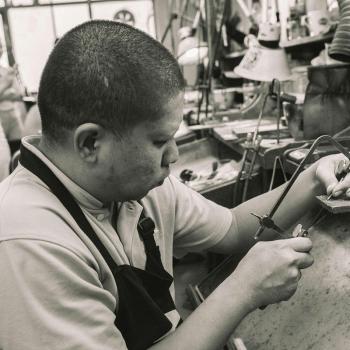Recently, I saw a meme of a father wielding the Shield of Faith to protect his young children from the “gay rainbow” that streamed toward their bed like a weapon. His other arm wrapped around them, he holds the Bible as they read together. The message is clear: Parents need to protect their children from “the gay agenda.” Faith and the Bible (as interpreted by the conservative church) are the covering that will help them do this. Not only is this a disgusting image—it also conveys something I’ll call the Doctrine of Covering, which is also a lie.

The Doctrine of Covering
Raised in conservatism, I believed in the Doctrine of Covering. This teaching is essential to ecclesiastical leaders who practice church discipline. Without the Doctrine of Covering, church discipline has no power. This article is the third installment in a series on church discipline. In “Matthew 18 and Spiritual Bullying,” I discussed the church’s misuse of Jesus’ words as an excuse to confront people with their sins. In “Are Pastors God’s Morality Police?” I critiqued the practice of excommunication. Today I will discuss how church discipline becomes abusive when it teaches people that they need the church as a spiritual covering.
Many Christians have been taught that the church is a spiritual covering. Like when I was a kid and held the blankets over my head to protect myself from monsters, I also believed that the church kept evil at bay. Sometimes this teaching is overt, and sometimes it is covert. Either way, members get the distinct impression that the church shields them from harm. Here are a few other types of coverings the church wants you to live under:
- Prayer Cover. During the Satanic Panic of the 1980s, Frank Peretti’s book This Present Darkness painted a stunning picture of warfare between angels and demons. Through prayer, the saints empowered the angels in their battle. Prayer cover was a defensive weapon that protected heavenly warriors as well as believers. Whether this is explicitly taught or merely suggested today, Christians still get the impression that not only is there physical safety in numbers, but spiritual safety as well. Like spiritual soldiers, Christians cover one another in the natural and the supernatural.
- The Blood of Jesus. Evangelicals describe the Christian as covered by the blood of Jesus. Not only does this blood wash away all our sins, but it also functions like a divine shield.
- The Shield of Faith. If you believe enough, you can extinguish all the fiery darts of the devil. The corollary is that if you feel defeated by life, then you aren’t believing enough.
- The Established Patriarchy. Another piece of art depicts a covering where under the Divine umbrella is the husband. As the godly husband is covered by God, the conservative wife is covered by the husband, and the obedient children are covered by the wife. Just imagine how vulnerable you would feel if you didn’t have all that covering! Why, you would feel as unshielded as an immodest teenage girl wearing a mini skirt and tank top!
- Modest Clothing. Oh, yes—this is another kind of covering that the church teaches. Modesty is a covering that will protect you from the dangerous and lecherous male gaze. If sexual abuse happens, it’s because the young woman stepped out of her covering of modesty, or obedience, or some other form of divine protection. Without the covering of proper clothing, the blood of Jesus, the shield of faith, and the prayers of the saints, the believer is in danger of physical harm and the loss of their immortal soul.
Covering and Church Discipline
This doctrine of covering is essential for those who want to exercise Church discipline. After all, there must be a consequence for sin. The Bible says the wages of sin is death. In church discipline, this looks like excommunication. Some denominations believe you must take communion to receive the grace of God. Therefore, to be excommunicated is to have that grace denied by the church. The keys to the kingdom, then, are the church’s ability to grant or withhold grace. For the excommunicated sinner, the removal of that covering is tantamount to spiritual death.
Most evangelicals don’t believe that the Lord’s supper can save you. They rarely use the word excommunication, which has to do with the withholding of communion. But the removal of a member from fellowship is much the same thing. Many unofficially believe that to have your name on the roll at a church is to have your name on the roll in heaven. If you are disfellowshipped on earth, then when the roll is called up yonder you won’t be there.
Besides the potential eternal consequence, there is the earthly consideration of living outside the umbrella of faith. Without the prayers of the saints to shield you, you are vulnerable to Satan’s attacks. This is why in 1 Corinthians 5, Paul recommended that a sinner be handed over to Satan for the saving of his soul. The hope was that with the shield removed, Satan would prick him with those fiery darts. If the sinner suffered enough, Paul hoped he would come running back with a repentant heart.
An Instrument of Control
Without the doctrine of covering, the church hasn’t got a leg to stand on if it wants to control its membership. How are you going to enforce your morality if it doesn’t matter whether or not you are disfellowshipped? If we allow you to believe that physical safety and eternal security are possible outside the local congregation, how can we enforce your behavior? I know some pastors who act as if behavior modification is what the church is all about. These ministers even refer to the practice of church discipline as “churching someone.” When the word church, used as a verb, means manipulating a person’s behavior, something is very wrong.
Dismantling the Doctrine of Covering
Of course, the idea of Divine covering falls apart when you realize that God doesn’t protect everyone, heal everyone, or rescue everyone. Spiritual naivete only lasts as long as nothing bad ever happens in your life. The problem with the Doctrine of Covering is that when suffering does come, it shatters the faith of the person who was raised to believe they would always be safe as long as they were part of the church.
Perhaps at some point, you have deconstructed the idea of special divine protection for Christians. The whole idea disintegrates when you realize that Christians and non-Christians die at exactly the same rate. And it’s not just deaths. As a hospital chaplain, I saw that Christians have just as many heart attacks as non-Christians. They fall off ladders just as much. God doesn’t put a hedge of protection around Christian soldiers in war, either. In fact, it’s possible that a fraction of those who believe in this heavenly covering will actually be less cautious and therefore less safe.
For that matter, Christians have just as many mental health issues and traumatic events as non-Christians. They suffer from just as much PTSD, anxiety, depression, bipolar disorder, schizophrenia, and anything else you might imagine. Just as God does not give us special physical protection, God also does not shield the heart and minds of believers any more than unbelievers.
The Best Covering the Church Can Offer
The idea that God has favorites and protects those in the church more than those outside the church is ridiculous. Yet, religious leaders who employ church discipline to control their membership must continue to teach this broken doctrine of spiritual covering. It would be so much better if people under the threat of excommunication realized that they would be better off outside of such a controlling environment and voluntarily left—either to find a healthier Church or no church at all. Pretty soon, other parishioners would catch on, and cease following spiritual bullies. Maybe the bullies would be the ones expelled from the church instead. In fact, kicking out the bullies would be the best covering the church can offer its members.












